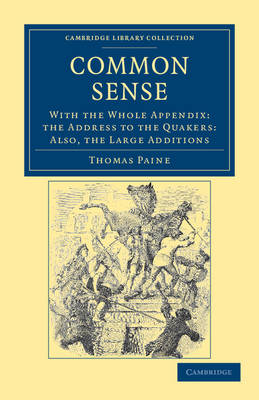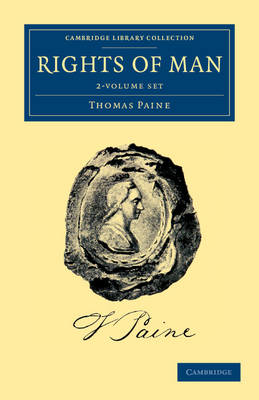Cambridge Library Collection - Philosophy
6 total works
Thomas Paine, defender of freedom, independence, and rational common sense during America's turbulent revolutionary period, offers insights into religion which ring sharply true more than two centuries later. This unabridged edition of The Age of Reason sets forth Paine's provocative observations on the place of religion in society.
This famous pamphlet - published anonymously in 1776 because of its seditious content - by the British political radical Thomas Paine (1737-1809) laid out his pioneering ideas for American independence, and earned him the title of 'Father of the American Revolution'. The Declaration of Independence, written chiefly by Thomas Jefferson and famously promulgated later that year, was influenced by Paine's arguments in this work: that America was too large to be governed by a country as small as Britain - which, he claimed, was ruling America only for its own financial gain - and that the colonies had now achieved the financial and military capacity to break free. Criticising the British monarchical system, with a single figure at its pinnacle, Paine called instead for a government that promoted security, liberty and equality for its people. Over half a million copies of this highly influential document were sold in America in its first year.
A Letter Addressed to the ABBE Raynal, on the Affairs of North America
by Thomas Paine
Published 14 March 2008
First published in 1782, this response to Raynal's The Revolution of America (also reissued in this series) by Thomas Paine (1737-1809) has been eclipsed by Paine's other work and largely overlooked. Written a year after Raynal's account of the American Revolution appeared in English, Paine's 'corrections' run to nearly eighty pages. His main critique of Raynal is that his argument stresses political theory rather than actions in the real world, an approach that lacks practicality. Paine argues against Raynal's assertion that the American War of Independence erupted over a tax dispute, and downplays France's involvement in the movement for independence. However, while attacking Raynal's influential work, he does so diplomatically, believing that the Abbe was writing from too great a distance to assess accurately the causes and principles of the conflict. This book has been hailed by scholars as the first of Paine's publications to demonstrate his internationalist views.
One of the great classics on democracy, Rights of Man was published in England in 1791 as a vindication of the French Revolution and a critique of the British system of government. In direct, forceful prose, Paine defends popular rights, national independence, revolutionary war, and economic growth - all considered dangerous and even seditious issues. In his introduction Eric Foner presents an overview of Paine's career as political theorist and pamphleteer, and supplies essential background material to Rights of Man. He discusses how Paine created a language of modern politics that brought important issues to the common man and the working classes and assesses the debt owed to Paine by the American and British radical traditions.
Rights of Man. Part the Second. Combining Principle and Practice
by Thomas Paine
Published 22 March 2012
A major actor in the American Revolution, English intellectual Thomas Paine (1737-1809) is remembered especially for his pamphlet Common Sense (1776; also reissued in this series), which advocates America's independence from Great Britain. A dedicated radical, Paine went on to lend his support to the French Revolution. In 1791, he published Rights of Man in response to Burke's Reflections on the Revolution in France (1790), a condemnation of the events in France. First published in 1792, this book is a continuation of Rights of Man. While the first volume was a passionate rebuttal of Burke's argument, this book - reissued here in its second edition - develops concrete measures for political reform, proposing novel concepts such as political representation and tax reform to benefit the poor. Widely circulated because of its low price, the book proved immensely influential, and resulted in indictments for seditious libel for Paine and his editor.
A major actor in the American Revolution, English intellectual Thomas Paine (1737-1809) is remembered especially for his pamphlet Common Sense (1776; also reissued in this series), which advocates America's independence from Great Britain. Paine was a dedicated reformer, who also lent his support to the French Revolution. First published in 1791, Rights of Man was sparked by the publication of Edmund Burke's Reflections on the Revolution in France (1790), and the fourth edition is reissued here. Paine argues that revolution is legitimate against a government that fails to protect its people and their essential rights. The second part was published in 1792, and develops concrete measures for political reform, proposing novel concepts such as political representation and tax reform to benefit the poor. Extremely influential and controversial in its own day, this book provides a critique of authoritarian governments and a very modern practical political philosophy.




